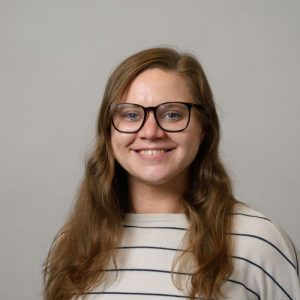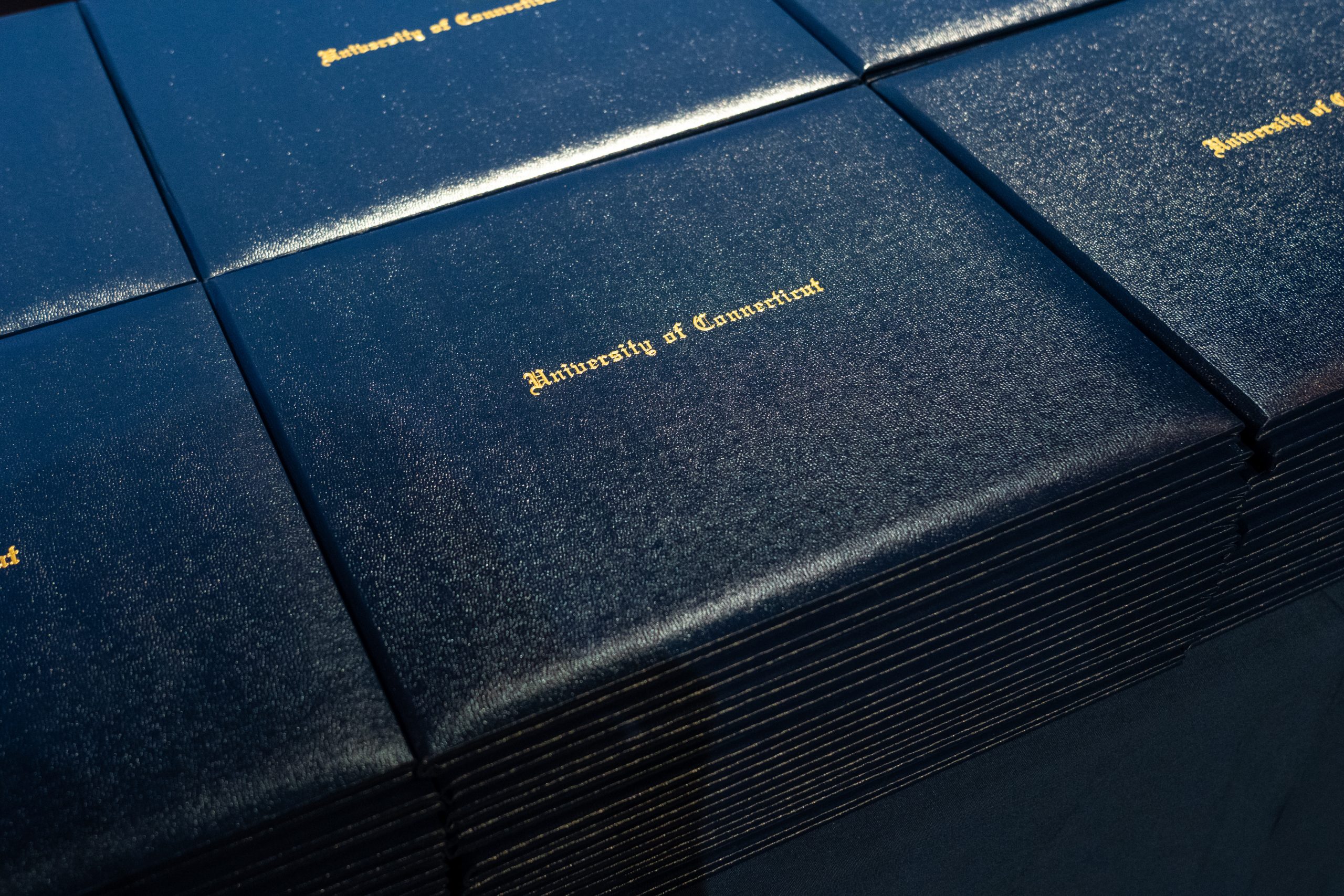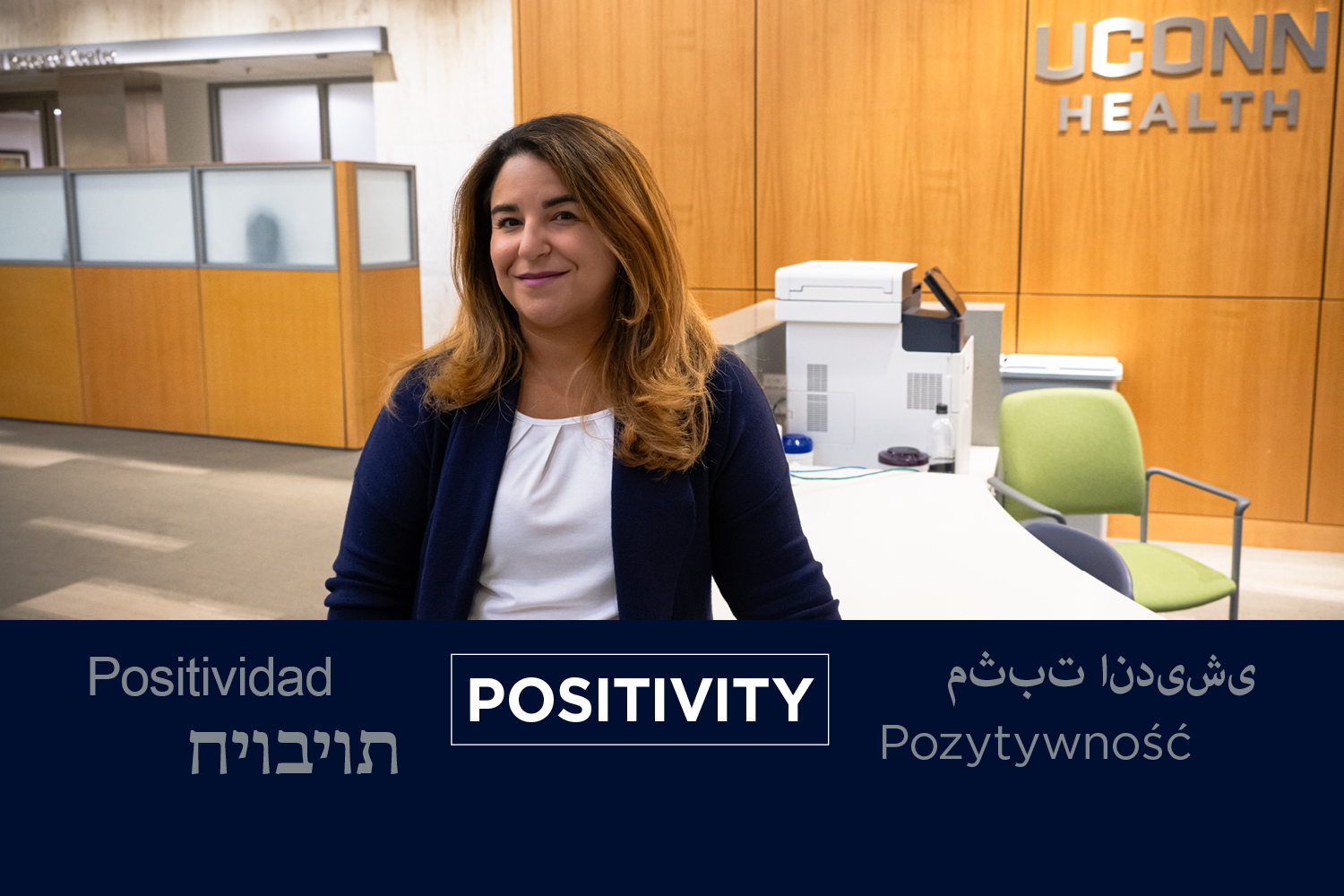Emily Loveland is a Ph.D. candidate at the UConn School of Social Work (SSW). She teaches courses on Macro Practice and Human Rights and Social Work.
What is the topic of your dissertation?
A. My dissertation looks at SNAP, or the Supplemental Nutrition Assistance Program, through a human rights lens, critically examining that program. Traditionally, I think SNAP policy is informed by issues of worth and worthiness, self-sufficiency and the rhetoric of pulling yourself up by your bootstraps. I take a critical approach, bringing a human rights lens into it by talking to people who are directly impacted by food insecurity so that we can more closely align people’s experiences with the policies and programs that are meant to solve those challenges.
How does a human rights lens affect how you look at SNAP and food insecurity more generally?
A. Typically, when we look at policies in the United States, we use what I call a needs-based or a charity-based approach. What are your basic needs? With food, if people are not using SNAP, they are often using food pantries or soup kitchens to help make ends meet. That’s what I mean by a charity-based approach. A human rights approach stands in stark contrast to that by saying everyone has a right to food. It’s really a progressive contrast to the current way that we’re looking at policies and programs by saying food is both a basic need and something that everyone has a human right to.
It’s supplemented by what’s called the legal human rights instruments. There are the Universal Declaration of Human Rights, International Covenants and international human rights principles. These are concepts – like universality – that support everyone’s right to adequate food or participation; that everyone who is affected by issues of food should be involved in the decision-making process around policies and programs related to securing the right to adequate food. That’s what my dissertation tries to do – bring folks who are affected by food insecurity to the table.
How are you conducting your research?

A. It’s two-pronged: One piece is a human rights policy analysis, which contains a qualitative document review and also a quantitative secondary data analysis. The second prong is a case study design where I am conducting in-depth, semi-structured interviews with individuals who are eligible for SNAP but not using SNAP benefits, as well as individuals who are advocates or volunteers that assist with SNAP processing. That’s getting at that human rights principle of participation and getting folks who are directly affected by food insecurity involved in talking about how they might better envision achieving food security and economic security.
What is the state of food insecurity in Connecticut right now?
A. Food insecurity rates have varied substantially. According to Feeding America, in Connecticut, 1 in 10 individuals face hunger. Food insecurity increases and decreases with the economy. We’re facing an increase in economic instability right now, so we’re bound to see increased rates of food insecurity and SNAP use as well.
Do you have preliminary findings to share?
A. In terms of my human rights policy analysis, I found that states are able to implement a fair level of control over SNAP participants. In my qualitative document review I found repeated references to terms like “impose,” “allow,” “permit” and “eligible food,” which highlight how regulations make SNAP eligibility conditional.
From my case study design, I found that policies were really incongruent with people’s lived experiences. Specifically, people’s interactions with case workers were a bit fraught. Though not always, at times case workers were either lacking empathy or rude or even attempting to wield power over the participant. Advocates I interviewed – social workers or people working in nonprofit settings, like a soup kitchen or a food pantry – were a critical lifeline to accessing SNAP benefits because they help people navigate this really challenging social safety net.
What is the impact you hope to have with your findings?
A. I want to offer recommendations to the Connecticut Department of Social Services (DSS), but I also want to investigate what’s going on with these policies and interactions with case workers. Are case workers shutting down because they don’t know how to apply these policies that are incongruent with people’s lived experiences? Perhaps instead of trying to interpret the policy so it best fits a person’s circumstance, case workers make the easiest choice.
Another factor I thought about was empathy interventions. Can you train eligibility workers at DSS on how to be more empathetic so that they can apply policies in a way that achieves the goals of an anti-hunger program? To that end, I think I would have to talk to eligibility case workers first to hear their perspectives regarding interactions with SNAP participants. For my next steps, I would like to work with eligibility staff to parse out what’s going on when they sit down with a SNAP applicant and try and apply these challenging policies to a person’s circumstances. Is it that we need to improve the role of empathy in these interactions or are other factors at play?
You are defending your dissertation this summer. What are your plans after UConn?
A. I’m actively on the academic job market. I plan to teach macro social work, thinking about policy and continuing this research. Wherever I go, I would love to replicate this work, talking to SNAP participants and case workers to see how we can improve these interactions.
If you were talking to a group of prospective Ph.D. students, what would you say about your experience at UConn?
A. I came back to UConn after earning my MSW in Policy Practice to pursue the Ph.D. program because I love the close-knit, collaborative environment. I found that the program was rigorous and collaborative, which is really unique for an R1 school. I can’t recommend it enough.

